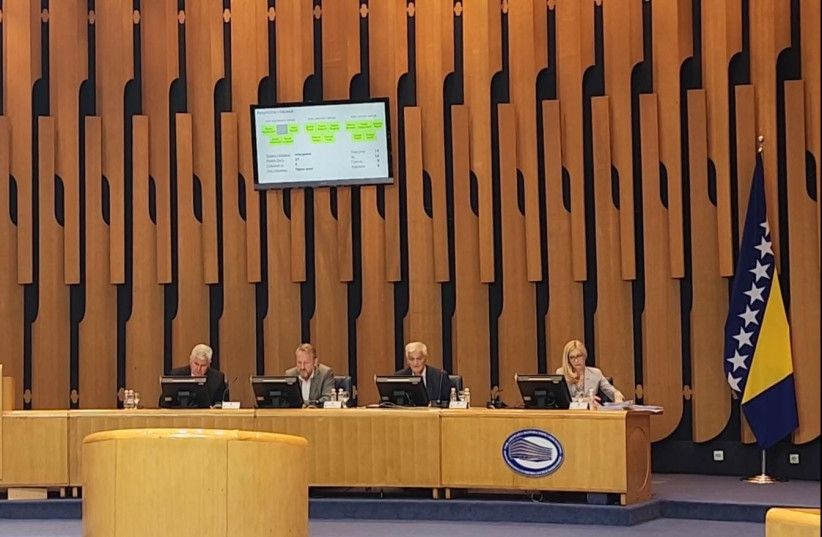In the coming days, the White House is expected to release what President Joe Biden has called “the first-ever US national strategy to counter antisemitism.” It will likely include calls to action by Congress, state and local governments, as well as guidance for technology and other companies, civil society and faith leaders.
In preparation, the Biden administration sought input from a wide range of Jewish community members and stakeholders, including the Conference of Presidents of Major American Jewish Organizations, which I lead. In addition to this engagement with the forthcoming report on antisemitism, I will travel to Cordoba, Spain, next month for the United Nations antisemitism summit, and then to the European Parliament in Brussels with parliamentarians from across the globe convening against antisemitism.
In both settings, the message of world Jewry remains unchanged: Adopting the International Holocaust Remembrance Alliance definition of antisemitism, known as IHRA, is an essential and seminal tool to combat anti-Jewish hate.

Support for adopting the IHRA definition is significant, as seen in a letter last week from over 175 Jewish community organizations around the world, a letter last week from over 600 rabbis from all four Jewish streams and dozens of letters from American Jewish organizations, all making the important case for adoption of the IHRA definition. Members of Congress have weighed in. Mayors have weighed in. Across the board, a strong and clear consensus of support exists for the definition.
The IHRA definition is the most authoritative and internationally accepted definition of antisemitism
Forty-one nations, as well as hundreds of local governments, academic institutions, NGOs and other entities have formally adopted in different ways the IHRA definition of antisemitism. Over half — 31 — American states also adopted it.
Since the Obama Administration, the US Department of State has utilized and promoted the IHRA definition (and previously, its similarly-phrased predecessor from the European Union’s Monitoring Centre on Racism and Xenophobia). Both Secretary of State Antony Blinken and the State Department’s Special Envoy to Monitor and Combat Antisemitism Ambassador Deborah Lipstadt are leaders in advocating for its usage around the globe. The U.S. Department of Education also employs the IHRA definition as a tool in determining antisemitism discrimination in Title VI discrimination cases.
The IHRA definition continues to gain significant attention and support among governments and civil society actors. Fifty-one of the 53 member organizations of the Conference of Presidents adopted the definition – a clear recognition from every corner of a disparate Jewish community that we are unified when it comes to applauding the comprehensive approach it provides for labeling and addressing antisemitism.
One particular aspect of the IHRA definition that draws attention — and criticism from some groups — is its treatment of the relationship between anti-Israel bias and antisemitism. For too long, definitions of antisemitism failed to account for how anti-Zionism often serves as a cover for antisemitism. Forms of antisemitism that are masked as “anti-Zionism” and that deny the right of the Jewish people to self-determination are among those most frequently encountered by many Jews today, whether or not they are Zionists, as documented in surveys by the Anti-Defamation League and by the EU Agency for Fundamental Rights.
The IHRA definition addresses the relationship between anti-Zionism and antisemitism, while not conflating legitimate criticism with actual antisemitism. Critics fail to identify actual instances where the IHRA definition suppressed free speech. In fact, over the last 20 weeks, as debates raged around the world over Israel’s proposed judicial reform — with hundreds of thousands of Israelis of all political stripes expressing virulent criticism of the Israeli government’s proposed overhaul — I have yet to hear one individual accuse the critics of being antisemitic. Despite the fact that the IHRA definition is so ubiquitous, legitimate speech that is critical of Israeli government policy is not censored. When put to the test, the IHRA definition does not do what its critics say it does.
We at the Conference of Presidents steadily campaign for states, localities, international governments and organizations to adopt the IHRA definition. The Biden administration seems poised to reassert their ongoing endorsement of the IHRA definition, pushing back yet again against those who distort the nature of the definition’s treatment of legitimate criticism of Israel governmental policies.
In a time when antisemitism in the United States has become all too often lethal, this would mean a vital and praiseworthy evolution of policy.
